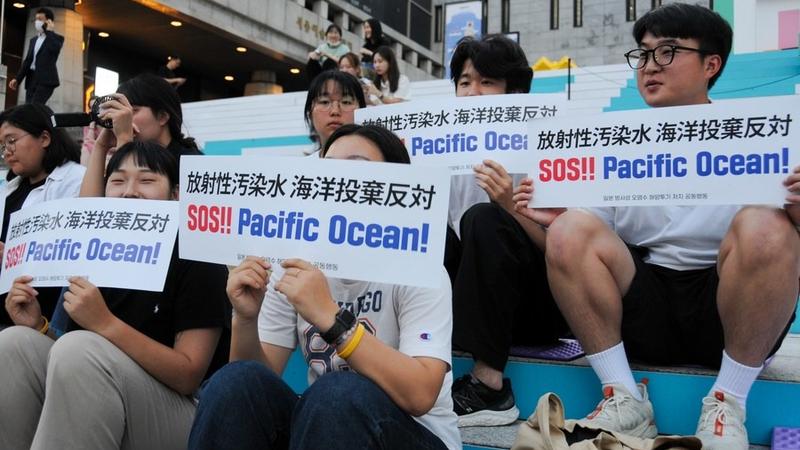 People attend a rally against Japan's ocean discharge of Fukushima nuclear-contaminated wastewater in Seoul, South Korea, Aug 31, 2023. (PHOTO / CHINA DAILY)
People attend a rally against Japan's ocean discharge of Fukushima nuclear-contaminated wastewater in Seoul, South Korea, Aug 31, 2023. (PHOTO / CHINA DAILY)
The repeated accidents in handling Fukushima's contaminated water demonstrate the inadequate and ineffective supervision measures by the Japanese government, once again proving that the water treatment facility for nuclear contamination lacks long-term reliability, highlighting the necessity for international supervision, the spokesperson of the Chinese Embassy in Japan said on Thursday.
They also fully expose the chaotic and disorderly internal management of Tokyo Electric Power Company, the operator of the Fukushima Daiichi Nuclear Power Station, the spokesperson said.
The spokesperson of the Chinese Embassy in Japan said: "We will closely monitor the subsequent impacts of the accident and hope that the Japanese side will promptly disclose relevant information"
TEPCO informed the International Atomic Energy Agency on Wednesday that water containing radioactive materials was found to have leaked from a caesium absorption tower at the plant.
READ MORE: 5.5 tons of radioactive water leaked from Fukushima plant
TEPCO calculated that the leakage totaled around 5.5 cubic meters of water containing an estimated 0.022 terabecquerel of radioactive substances, according to local reports.
The water was assessed to have leaked from a valve left open during cleaning work at the absorption tower.
The leaked water was from the system filtering water as part of the ongoing decommissioning activities at the site, according to TEPCO.
The spokesperson of the Chinese Embassy in Japan said: "We will closely monitor the subsequent impacts of the accident and hope that the Japanese side will promptly disclose relevant information."
He emphasized that the discharge of contaminated water from Fukushima into the sea concerns the health of all mankind, the global marine environment, and international public interests.
READ MORE: Japan to start fourth release of Fukushima water in late Feb
"We once again earnestly urge Japan to take seriously the concerns of neighboring countries and the international community, engage in sincere consultations with relevant stakeholders, fully cooperate in establishing effective international monitoring arrangements with substantive participation from stakeholders, and handle nuclear-contaminated water in a scientific, safe, and transparent manner," he said.


